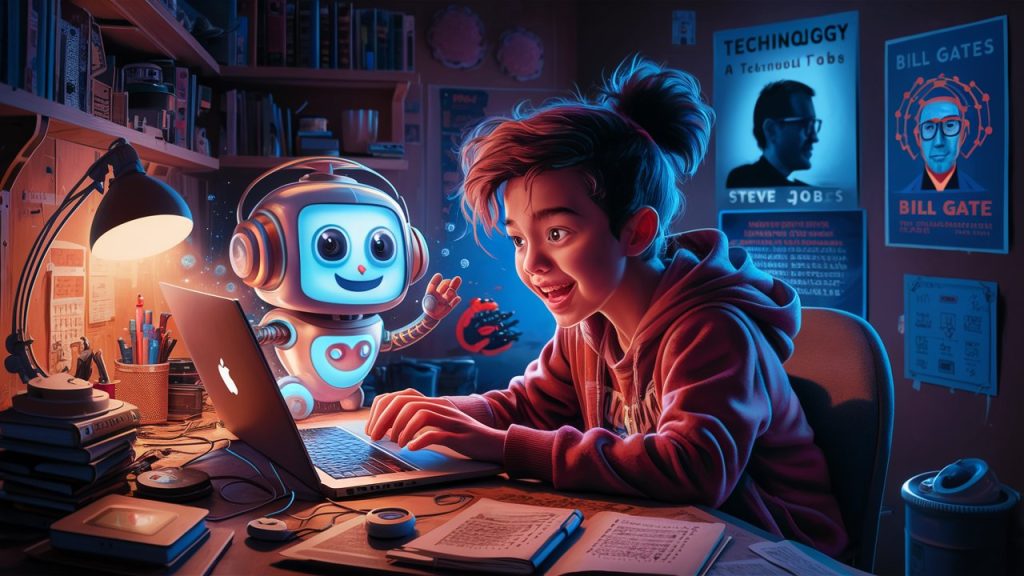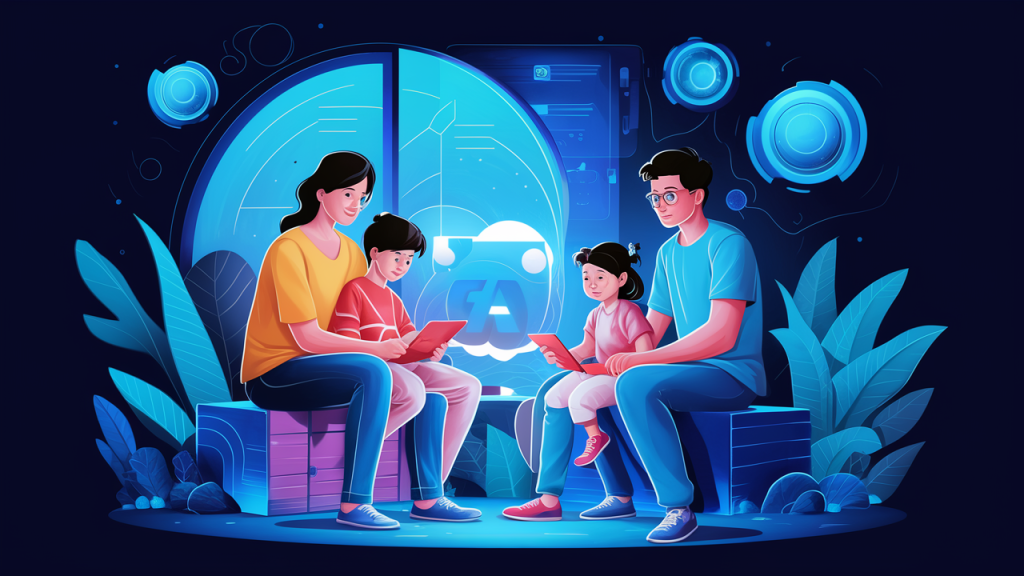In today’s rapidly evolving digital age, AI for kids is no longer a futuristic concept but a reality that is shaping our world in profound ways. As parents, it’s essential to recognize the immense potential and opportunities that generative AI presents for our children’s education and future careers. By fostering an early understanding and appreciation of this transformative technology, we can empower our kids to become active participants in this exciting frontier.
What is AI?
Artificial Intelligence, or AI, refers to the development of computer systems capable of performing tasks that typically require human intelligence, such as learning, problem-solving, reasoning, and decision-making. AI systems are designed to mimic human cognitive functions and can continuously improve their performance based on the data they are exposed to.
Why is AI Important for Kids?
AI is rapidly permeating various aspects of our lives, from virtual assistants and smart home devices to advanced healthcare and transportation systems. By introducing AI concepts to children at an early age, we equip them with the knowledge and skills necessary to navigate and thrive in an AI-driven world. Additionally, exploring generative AI can spark their curiosity, foster critical thinking, and encourage them to approach problems from innovative perspectives.

5 Tips for Parents to Support Children’s AI Exploration
1. Coding and Programming:
Introducing kids to coding and programming serves as an excellent gateway to understanding AI. It lays a strong foundation for grasping AI concepts by familiarizing them with the logic and structures underlying computer systems. Platforms like Scratch, Code.org, and Tynker offer engaging, kid-friendly environments where children can learn coding through interactive games and projects. These platforms gamify the learning experience, making it enjoyable and accessible for young learners while simultaneously building their computational thinking and problem-solving skills.
2. Robotics and Electronics:
Exploring robotics and electronics provides children with hands-on experience in applying AI concepts to real-world scenarios. Building and programming robots or electronic devices allow them to understand how AI algorithms interact with sensors, actuators, and decision-making processes. Robotics kits such as LEGO Mindstorms or Ozobot offer tangible learning experiences where children can design, build, and program their robots, fostering creativity and critical thinking. Through these activities, kids develop a deeper understanding of AI principles and gain practical skills in engineering and problem-solving.
3. AI-Powered Apps and Games:
AI-powered apps and games offer interactive platforms for children to explore AI concepts in a playful and engaging manner. These apps introduce kids to various AI technologies such as machine learning, natural language processing, and computer vision through hands-on activities. For instance, chatbots simulate conversations, language translators facilitate communication across languages, and image recognition apps allow children to interact with AI algorithms in real-time. By interacting with these applications, kids not only learn about AI but also develop digital literacy skills and an understanding of how AI impacts their daily lives.
4. Online Courses and Tutorials:
With the growing popularity of generative AI, many online platforms offer age-appropriate courses and tutorials specifically designed for kids. These resources can cover topics ranging from basic AI principles to more advanced concepts like neural networks and deep learning. One such platform is {igebra.ai}, which provides a comprehensive Generative AI Course tailored for young learners. Through interactive lessons and engaging activities, {igebra.ai} introduces children to the fundamentals of generative AI, guiding them from the basics to more complex concepts like creating their own neural networks. This course empowers kids to explore the exciting world of AI in a fun and accessible way, nurturing their curiosity and sparking their interest in this transformative technology.
5. AI-Themed Books and Videos:
Books and educational videos can be excellent resources for sparking interest and curiosity about AI. Look for age-appropriate materials that present AI concepts in an engaging and relatable manner, using storytelling or real-world examples.
Creating an AI-Friendly Environment at Home
To foster a supportive environment for your child’s AI exploration, consider the following tips:

Set up a Dedicated Space Create a designated area or corner in your home where your child can work on AI projects, experiment with coding or robotics kits, and engage in hands-on learning activities.
1. Encourage Exploration and Curiosity:
Celebrate your child’s curiosity and encourage them to ask questions, explore new ideas, and experiment with different generative AI tools and concepts. Provide them with the resources and support they need to fuel their interests.
2. Collaborate and Learn Together:
Don’t be afraid to learn alongside your child. Engage in AI-related activities together, research topics of mutual interest, and collaborate on projects. This shared learning experience can strengthen your bond and deepen your understanding of AI.
3. Connect with Like-Minded Families and Communities:
Seek out local or online communities of parents and children interested in AI. Participating in workshops, meetups, or online forums can provide valuable networking opportunities, access to resources, and a support system for your child’s AI journey.
The Benefits of Encouraging AI Exploration for Kids

1. Future Career Readiness:
AI for kids is reshaping industries and creating new job opportunities that didn’t exist before. By exposing children to AI early on, we prepare them for careers in fields such as robotics, data science, machine learning, and technology development. They will gain a competitive edge and be better equipped to adapt to the ever-changing job market.
2. Enhancing Problem-Solving and Creativity:
AI encourages children to think critically, analyze data, and develop creative solutions to complex problems. As they engage with generative AI concepts and tools, they learn to break down challenges into smaller components, identify patterns, and explore alternative approaches to problem-solving.
3. Fostering Collaboration and Communication:
Many AI projects involve teamwork and collaboration, which helps children develop essential soft skills like communication, negotiation, and conflict resolution. By working together on AI-related tasks, they learn to appreciate diverse perspectives and leverage each other’s strengths.
Final Thought
Encouraging your child’s exploration of generative AI is an investment in their future success and a gateway to countless opportunities. By fostering an early understanding and appreciation of this transformative technology, you empower your child to become a confident and capable participant in the AI-driven world. Embrace the journey, celebrate their curiosity, and provide them with the resources and support they need to thrive. Together, you can unlock the boundless potential of AI and pave the way for a brighter, more innovative future.



